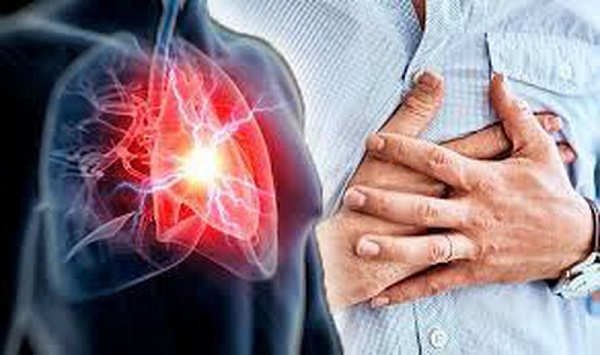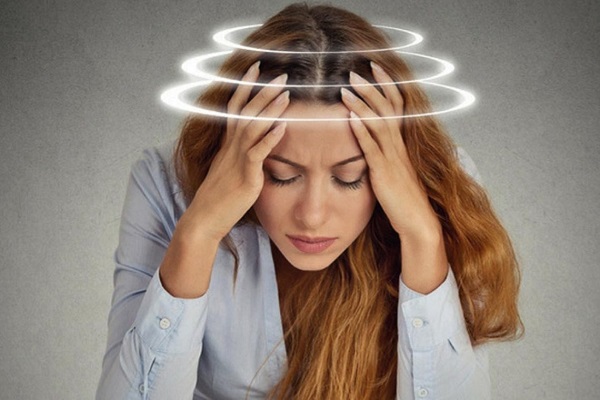Tuoi Tre News - There are different types of treatment for each type of cardiovascular disease, but people may have similar symptoms.
In Vietnam, the number of patients with cardiovascular disease is increasing. Each type of disease has different treatment methods, but the patient may have the same symptoms.
Therefore, the patient himself must equip himself with the basic knowledge to be able to recognize what are the warning signs of cardiovascular disease to help detect and treat the disease in time. The following are common manifestations of heart disease.

Shortness of breath, chest pain - a sign of cardiovascular disease.
Dyspnea: risk sign of cardiovascular disease
- Shortness of breath is triggered or exacerbated by exertion and causes increased left atrial pressure and pulmonary veins or hypoxemia.
- Left atrial hypertension and pulmonary veins are the most common left ventricular diastolic dysfunction (caused by hypertrophy, fibrosis or pericardial disease) or valve obstruction. The onset or worsening of left atrial pressure can lead to pulmonary edema. Hypoxemia may be due to pulmonary edema or intravascular flow.
- Shortness of breath must be determined by the level of activity causing it. Dyspnea is also a common symptom of lung diseases and it is difficult to distinguish the pathogenesis, dyspnea can also occur in less walkable or obese people, people with anxiety, anemia and many diseases. other.
Shortness of breath when lying down is due to an increase in central blood volume. Difficulty breathing while lying down can also be caused by lung disease and obesity.
Paroxysmal nocturnal dyspnea is alleviated by sitting or standing, which is more specific in heart disease.
Chest tightness: a risk sign of cardiovascular disease
Chest pain can occur as a result of a lung or bone disease, esophageal or gastrointestinal disease, irritation of the cervical nerve roots, or anxiety or cardiovascular disease.
The most common cause of heart attack chest pain is ischemic heart attack.
Pain is often described as dull, aching, or as a feeling of squeezing, squeezing, tightening or stuffy rather than stabbing or cramping, and it is often perceived as a more irritable sensation. is sore. Ischemic pain usually subsides within 30 minutes, but it can last longer.
Prolonged pain often corresponds to a heart attack, pain is often accompanied by feelings of uneasiness or anxiety. The pain site is usually behind the sternum or the left prefrontal region. Although pain may spread to or localize in the pharynx, lower jaw, shoulder blades, inner face of the arm, upper abdomen or back, it almost covers the sternum region. Ischemic pain is often caused by exertion, cold temperatures, after meals, stress, or a combination of these factors that often accelerate and often subside with rest. Pain that is not related to posture or breathing and usually does not occur when palpating the chest. In myocardial infarction, a motivating factor is usually not obvious.
Left ventricular hypertrophy or aortic valve disease may also result in pain due to anemia or less typical pain. Myocarditis, cardiomyopathy and mitral valve prolapse are often associated with atypical chest pain. Pericarditis can cause pain but it varies with posture and respiration. Aortic aneurysm causes pain like a sudden tear in the chest and often spreads behind the back.
Suspense, fainting or fainting
Recognizing that the heartbeat may be normal or may reflect an increase in cardiac output or an increase in cardiac output in patients with a variety of conditions outside the heart (exertion, thyrotoxicosis, anemia). , worry,…). It may also be due to cardiovascular diseases that increase the volume of puffs (heart valve leaks, bradycardia) or may be a sign of a heart rhythm disorder. Ventricular premature contractions can be felt like extrasystole or leapfrog. Supraventricular or ventricular tachycardia, the patient may feel rapid or irregular beating or fluttering. However, many patients do not show any symptoms.
If the irregular heartbeat combined with a significant decrease in blood pressure and cardiac output, it may, especially in an upright position, affect blood flow to the brain, causing dizziness, blurred vision, and loss of consciousness. (fainting) or other symptoms.

Do not ignore signs of suspense, dizziness.
The most common cardiac syncope is due to sinus node stoppage or sinus block exit pathways, AV block, or ventricular tachycardia or ventricular fibrillation. Fainting may have a few million signs and may cause injury. The absence of warning symptoms helps distinguish between fainting heart (Adams - Stokes) with fainting due to vagus nerve vessels, postural hypotension or seizures. Although often reversible, some patients may experience seizure-like movements. Aortic valve disease and obstructive hypertrophic heart disease can also cause fainting and often occur during exertion or after exertion. Another form of syncope is the topic that has attracted significant attention in recent years called fainting due to cardiac nerve. In this syndrome there is an inappropriate increase in centrifugal vagal activity, usually due to an increase in sympathetic nervous stimulation of the previous heart. But it can happen suddenly just like fainting from a heart rhythm disorder.
Cardiovascular and stroke club
With the aim of updating the community with new and useful information on cardiovascular disease - stroke, City International Hospital launches the Heart - Stroke Patients Club (Club). The program will take place periodically on the fifth day of the 2nd week or the 3rd week of each month.
The program will discuss in-depth the pathology, including high risk factors for stroke, hyperlipidemia, hypertension & atherosclerosis, diabetes complications leading to stroke, and how to control stroke ...
Time: At 13:15 on August 29, 2019.
Location: Hall 4th floor, City International Hospital (No. 03, Street 17A, Binh Tri Dong B Ward, Binh Tan District, Ho Chi Minh City).
Subject: Have you exceeded your stroke risk warning threshold?
Speaker: Ms. Tran Thi Mai Thy - Specialist in Stroke Neurology & Dr. Huynh Hong Chau - Head of Neurosurgery Department of City International Hospital
Registration
- Ms Thuy: 0909 802 936
- Email: This email address is being protected from spambots. You need JavaScript enabled to view it.
- Sign up on Fanpage: https://www.facebook.com/BenhVienQuocTeCity/.
- Register at the link: http://bit.do/hoi-thao-dot-quy
Should you have any questions, please do not hesitate to contact us:
City International Hospital
- Address: No. 3, 17A Street, Binh Tri Dong B Ward, Binh Tan Dist. (Next to AEON Mall Binh Tan). Ho Chi Minh City.
- Operator: (+8428) 6280 3333, ext. 0
- 24/7 Emergency: (+8428) 6290 1155
- Website: https://cih.com.vn/en/
- Fan page: https://www.facebook.com/BenhVienQuocTeCity/
- Email: This email address is being protected from spambots. You need JavaScript enabled to view it.
General disclaimer
Always consult your doctor regarding any concern about your health. Your doctor will be in the best position to give the appropriate medical advice. For suspected undesirable drug reaction and seek medical attention immediately.










